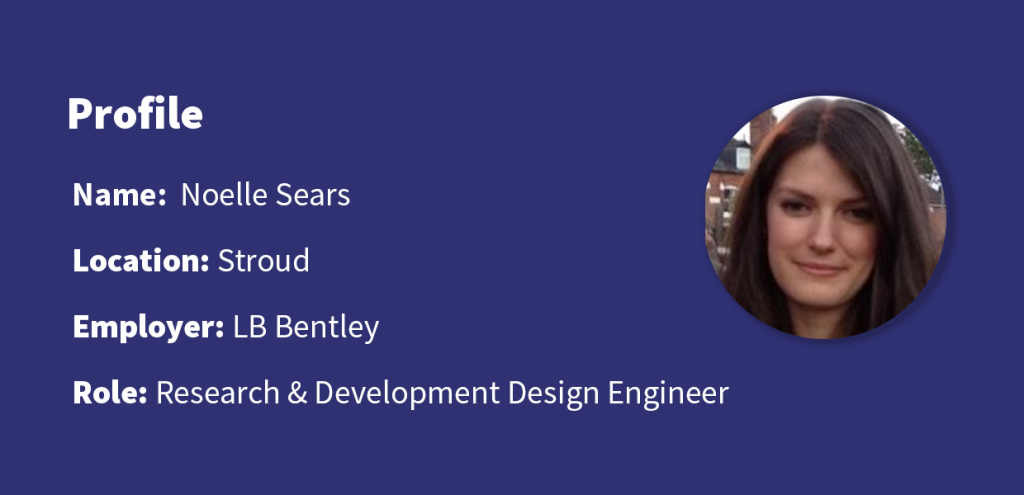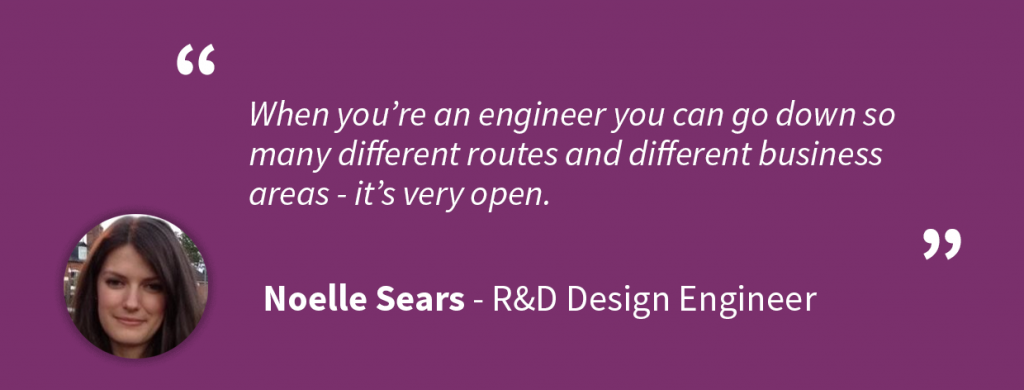To celebrate the annual International Women in Engineering Day, we wanted to reach out to real women in the industry who have managed to break through the glass ceiling in the engineering room. With the fact that the UK has the lowest percentage of female engineers in Europe, we wanted to chat to a female engineer to learn more about their career, the way they got into the industry, and also their thoughts on being a woman in such a male-dominated area. After a bit of outreach, we got in contact with Noelle Sears, a Research & Development Design Engineer for LB Bentley.
Noelle has achieved a lot in her life. Starting with an advanced apprenticeship after A-levels, she has worked her way up and around the engineering scene, landing herself a job that she loves. With a Chartership on the horizon, Noelle is an inspiration for those determined to work hard.

Noelle’s career
Hi Noelle. Thank you for taking the time to do this – I really appreciate it.
That’s alright!
I want to start by asking some questions about your career and current role, before discussing the wider industry itself. So, when did your interest in engineering begin?
It’s the whole traditional “I have always been interested in how things work” thing. I’ve never been one to take cars apart, but I like being practical. When I was doing my A-levels, I wanted to be a Sound Engineer and work in a recording studio. I then figured out that I would struggle to get a job doing it, not earn any money and make tea for most of my life – trying to get into that industry is all about who you know, not what you know. When I went onto my A2s I made the decision that I was going into engineering because there was a lot of talk about a lack of engineers and particularly female engineers. During A2s I picked up on this, so from a practical point of view I got a job where there was going to be a lot of jobs available – a gap in the market.
I also wanted to use my brain and continue learning – so it was important for me to continue my study in a job and potentially have some practical elements involved as well.
So you mentioned you started your apprenticeship after your A-levels. Where was that?
I did my apprenticeship at a company in Cheltenham called Spirax Sarco. I went on to the apprenticeship scheme with an agreement to do my HND [Higher National Diploma] because the apprenticeship was an advanced apprenticeship. So I did my year at technical college which was all on the machines – so kind of intimidating if you’re new to it! And I was the only female and I was really shy at the time.
That must have been a little scary?
It was a little bit, but you just have to throw yourself at these things. It takes a certain type of personality to stick at it.
Absolutely. How did you find the apprenticeship?
I really enjoyed it. I do feel like my time could have been more efficiently used, but I did go to a lot of departments within the company which was great and you learn a huge amount about the whole business. That was one year at technical college, a couple of years moving about around the business and then in my final year I got a placement in product development where they design all the products. I made myself a home there and impressed the right people so they offered me a job when my apprenticeship finished.
I was looking at your LinkedIn and you’ve done a lot! Do you mind talking me through the time between now and when you were first employed post apprenticeship?
I’ll give you a quick explanation because you can probably see my there’s a lot on my profile [laughs]! I stayed at Spirax for four years post apprenticeship in the development team which was great – but I find that if you stay in the company that you did your apprenticeship in you’re always viewed as the junior team member. So I then decided to get a job in a new company just to spread my wings for both my confidence and career. I got a job in Birmingham as a Design Engineer. It was a medium-sized company but the engineering team was small, so it was just me and my boss so I learned a huge amount.
It was really good experience because it built up my confidence but then they decided to move the company to Coventry so I left and got a job back in Cheltenham at Assa Abloy. That was doing window hardware… [pauses] I thought it didn’t matter what you were designing – and to a certain extent it doesn’t – but window hardware isn’t the most exciting of things. Hinges… Less exciting than I would have liked [laughs]. It was really good experience because as a company they are very into their lean manufacturing and Japanese business techniques in terms of efficiency and reducing waste. I was a Product Engineer there, so we ran projects as well as designing the products, so you’d be learning about project management techniques and how to prioritise work.
And… [pause] why did I leave there? Because I wasn’t into window hinges. I jumped about pretty much every year after I left my first company. After that, I did a bit of a career change… As you can tell when you’re an engineer you can go down so many different routes and different business areas – it’s very open.

I can imagine that it makes the industry a very exciting one to operate in?
Yeah! So I could leave and go to Aerospace or something to do with the railways – you can pick your interest which is great. So after that I wanted to try out renewable energy [laughs] because I quite like the whole environmental aspect and thought it would be nice to go into a business where I thought I was doing something positive for the world. It was not what I imagined, and working for a small company isn’t always a good thing. It’s dependent on who they are, but I didn’t feel like I had a future there and didn’t think the company would exist in a year or two.
So the job lacked security?
The job was insecure, it was high stress and no reward.
So I’ve got my current job. I never imagined I’d be working in Stroud because I wanted a job in Cheltenham and my job criteria was local, half day Fridays and more money. You have to aim high because every time you move your job, that’s when you get your reward. You can have a pay increase and pick the things that are important to you. I didn’t get everything that I wanted but I’m really happy where I am now.
So what are your main responsibilities in the role that you have now?
I’m technically Research & Development Design Engineer… it’s quite a long one. So R&D is looking into new things but then there is the design aspect as well, so we might improve existing products, we might create new products or we might try out different materials or different testing techniques. It’s quite varied and there’s always a huge amount to do.
How are you finding it?
I have been here for just over a year now and my colleague that taught me the job left a while ago so we are short staffed at the moment but it’s meant that I have had to learn everything super quick and take a lot of responsibility. In that sense it is great because people are coming to me with all these technical questions so I feel like I am essential to the runnings of the company which is a nice feeling.
Noelle’s future
Do you have a set plan for the future?
Kind of. Getting Chartered would be something that I would want to do. To get my Chartership, I technically need a Masters degree but I only have a Bachelor of Engineer Honours degree… But where I work have been great – they have provided me training courses where required, they are sponsoring me for my Masters degree so I can tick more boxes to get my Chartership, and on Friday I am travelling to Houston to meet clients so they are sending me out there for a couple of weeks. It’s a big investment on their part.
That’s so nice to have a company properly behind you…
Yeah! It’s really high-stress because we are short-staffed and I feel like I don’t know enough because I have only been here for a year. But in terms of opportunities open to me, it’s as much as I could wish for.
Noelle’s thoughts on the engineering industry and girls in STEM
Something a bit more general, at Springpod we have recently been writing quite a lot about how to get girls into STEM and the lack of women in the industry. How have you found being a woman working in the engineering industry?
It was difficult at the start because I was quite self-conscious and shy. But I think your confidence grows as you go through. And to be honest, anyone moving from an educational environment to a work-based environment, even if they are a bloke, it’s quite intimidating.
I think half the problem is that women assume that it’s not suitable for them so therefore they won’t try or assume they won’t enjoy it. But I think so many women would if they gave it a shot. Engineering is so varied, there’s something for everyone.
Do you think the next steps for trying to get more girls into STEM starts at school?
I feel like the UK is slightly behind in comparison to other countries; we see women in engineering as needing a special drive and it being a special thing, whereas in other European countries it’s just normal. They come into engineering and you don’t have to have a special drive, you don’t have to persuade them that it’s a good thing or the right thing.
At school, I started doing DT and they cancelled that and I had to do Graphic Design. I hated that so much and so I did Textiles, but this just shows that the opportunities weren’t there. With the government doing more and more Diplomas, I think it’s a positive move but my concern still is that they won’t be seen as ones suitable for women to do in the UK.
Would you give any particular advice to girls just starting in the STEM industry or thinking about doing so?
I’d probably say just go in and be yourself because you want to be valued for who you are. Don’t try and be like the other people around because it’s much more important that everyone contributes themselves, because that’s what make companies work the best. So yeah, don’t try and prove yourself, just be who you are and people will respect you for doing a good job and having a good attitude. And plus, try and enjoy it [laughs]!
A few final questions
How do you unwind from an intense day at work?
I have moved closer to work recently so I now play for the local touch rugby team which is fun. It’s good therapy [laughs] – having a run around outside is always good. I’ve started cycling to and from work which is great because I think it really helps to do some physical activity, helping the mind to get rid of the stress [laughs].
And lastly, what do you think you’d be doing if you weren’t working in Engineering?
I originally wanted to be a Sound Engineer but I can’t picture it anymore… Sound Engineering has the word “engineering” in but it’s not in the engineer industry, it’s more creative and working in a recording studio. It’s just someone that makes the music sound good, isn’t it?
Thank you so much for taking the time to chat to us, Noelle! We wish you the best of luck in your future endeavours – and go get that Chartership.







